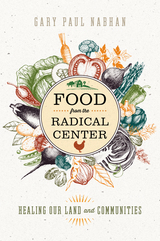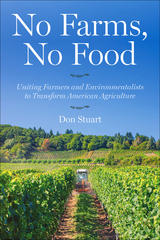3 books about Agricultural conservation

Food from the Radical Center
Healing Our Land and Communities
Gary Paul Nabhan
Island Press, 2018
"Informational and inspirational." —Booklist
America has never felt more divided. But in the midst of all the acrimony comes one of the most promising movements in our country’s history. People of all races, faiths, and political persuasions are coming together to restore America's natural wealth: its ability to produce healthy foods.
In Food from the Radical Center, Gary Nabhan tells the stories of diverse communities who are getting their hands dirty and bringing back North America's unique fare: bison, sturgeon, camas lilies, ancient grains, turkeys, and more. These efforts have united people from the left and right, rural and urban, faith-based and science-based, in game-changing collaborations. Their successes are extraordinary by any measure, whether economic, ecological, or social. In fact, the restoration of land and rare species has provided—dollar for dollar—one of the best returns on investment of any conservation initiative.
As a leading thinker and seasoned practitioner in biocultural conservation, Nabhan offers a truly unique perspective on the movement. He draws on fifty years of work with community-based projects around the nation, from the desert Southwest to the low country of the Southeast. Yet Nabhan’s most enduring legacy may be his message of hope: a vision of a new environmentalism that is just and inclusive, allowing former adversaries to commune over delicious foods.
America has never felt more divided. But in the midst of all the acrimony comes one of the most promising movements in our country’s history. People of all races, faiths, and political persuasions are coming together to restore America's natural wealth: its ability to produce healthy foods.
In Food from the Radical Center, Gary Nabhan tells the stories of diverse communities who are getting their hands dirty and bringing back North America's unique fare: bison, sturgeon, camas lilies, ancient grains, turkeys, and more. These efforts have united people from the left and right, rural and urban, faith-based and science-based, in game-changing collaborations. Their successes are extraordinary by any measure, whether economic, ecological, or social. In fact, the restoration of land and rare species has provided—dollar for dollar—one of the best returns on investment of any conservation initiative.
As a leading thinker and seasoned practitioner in biocultural conservation, Nabhan offers a truly unique perspective on the movement. He draws on fifty years of work with community-based projects around the nation, from the desert Southwest to the low country of the Southeast. Yet Nabhan’s most enduring legacy may be his message of hope: a vision of a new environmentalism that is just and inclusive, allowing former adversaries to commune over delicious foods.
[more]

No Farms, No Food
Uniting Farmers and Environmentalists to Transform American Agriculture
Don Stuart
Island Press, 2022
America’s farms are key to the preservation of vital ecosystems and a stable climate. Yet farmers and environmentalists have not always seen eye-to-eye about the best ways to manage agricultural landscapes. Since 1980, American Farmland Trust (AFT) has been bringing people together to work for healthy land and a healthy food system.
No Farms, No Food traces the development of this powerful coalition responsible for landmark achievements in farmland preservation and conservation practices. It all began with Peggy Rockefeller’s determination to stop the inexorable urban sprawl that was threatening the nation’s agriculture. From this humble start grew a small but astute organization, and more importantly, a formidable constituency of farmers and environmentalists united around a common cause.
With leadership from AFT, that constituency drove through Congress the first “Conservation Title” in the history of the U.S. Farm Bill; oversaw the development of agriculture conservation easement programs throughout the country; and continues to develop innovative approaches to sustainable agriculture.
No Farms, No Food takes readers inside the political and policy battles that determine the fate of our nation’s farmland. And it illustrates the tactics needed to unify fractured interest groups for the common good. No Farms, No Food is both an inspiring history of agricultural conservation and a practical guide to creating an effective advocacy organization. This is an essential read for everyone who cares about the future of our food, farms, and environment.
No Farms, No Food traces the development of this powerful coalition responsible for landmark achievements in farmland preservation and conservation practices. It all began with Peggy Rockefeller’s determination to stop the inexorable urban sprawl that was threatening the nation’s agriculture. From this humble start grew a small but astute organization, and more importantly, a formidable constituency of farmers and environmentalists united around a common cause.
With leadership from AFT, that constituency drove through Congress the first “Conservation Title” in the history of the U.S. Farm Bill; oversaw the development of agriculture conservation easement programs throughout the country; and continues to develop innovative approaches to sustainable agriculture.
No Farms, No Food takes readers inside the political and policy battles that determine the fate of our nation’s farmland. And it illustrates the tactics needed to unify fractured interest groups for the common good. No Farms, No Food is both an inspiring history of agricultural conservation and a practical guide to creating an effective advocacy organization. This is an essential read for everyone who cares about the future of our food, farms, and environment.
[more]

Opening Windows
Embracing New Perspectives and Practices in Natural Resource Social Sciences
Kate Sherren
Utah State University Press, 2024
The third decennial review from the International Association for Society and Natural Resources, Opening Windowssimultaneously examines the breadth and societal relevance of Society and Natural Resources (SNR) knowledge, explores emergent issues and new directions in SNR scholarship, and captures the increasing diversity of SNR research. Authors from various backgrounds—career stage, gender and sexuality, race/ethnicity, and global region—provide a fresh, nuanced, and critical look at the field from both researchers’ and practitioners’ perspectives.
This reflexive book is organized around four key themes: diversity and justice, governance and power, engagement and elicitation, and relationships and place. This is not a complacent volume—chapters point to gaps in conventional scholarship and to how much work remains to be done. Power is a central focus, including the role of cultural and economic power in “participatory” approaches to natural resource management and the biases encoded into the very concepts that guide scholarly and practical work. The chapters include robust literature syntheses, conceptual models, and case studies that provide examples of best practices and recommend research directions to improve and transform natural resource social sciences. An unmistakable spirit of hope is exemplified by findings suggesting positive roles for research in the progress ahead.
Bringing fresh perspectives on the assumptions and interests that underlie and entangle scholarship on natural resource decisionmaking and the justness of its outcomes, Opening Windows is significant for scholars, students, natural resource practitioners, managers and decision makers, and policy makers.
This reflexive book is organized around four key themes: diversity and justice, governance and power, engagement and elicitation, and relationships and place. This is not a complacent volume—chapters point to gaps in conventional scholarship and to how much work remains to be done. Power is a central focus, including the role of cultural and economic power in “participatory” approaches to natural resource management and the biases encoded into the very concepts that guide scholarly and practical work. The chapters include robust literature syntheses, conceptual models, and case studies that provide examples of best practices and recommend research directions to improve and transform natural resource social sciences. An unmistakable spirit of hope is exemplified by findings suggesting positive roles for research in the progress ahead.
Bringing fresh perspectives on the assumptions and interests that underlie and entangle scholarship on natural resource decisionmaking and the justness of its outcomes, Opening Windows is significant for scholars, students, natural resource practitioners, managers and decision makers, and policy makers.
[more]
READERS
Browse our collection.
PUBLISHERS
See BiblioVault's publisher services.
STUDENT SERVICES
Files for college accessibility offices.
UChicago Accessibility Resources
home | accessibility | search | about | contact us
BiblioVault ® 2001 - 2024
The University of Chicago Press









